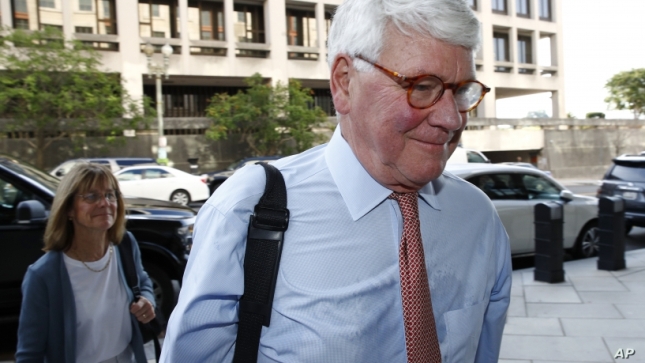
How Democratic Insider Greg Craig Got Caught Up in the Russia Probe
VOA News By Masood Farivar
WASHINGTON – Greg Craig is an improbable figure in the national saga formerly known as the «Russia Investigation.»
While almost everyone caught in former special counsel Robert Mueller’s cross-hairs — from Paul Manafort to Roger Stone — had close ties to President Donald Trump’s orbit, Craig was a conspicuous outsider.
The 74-year-old veteran Washington lawyer and Democratic insider served in prominent positions in the administrations of former Presidents Bill Clinton and Barack Obama before joining a white-shoe New York law firm in recent years.
Declining fortunes
Since then, Craig’s fortunes have taken a hit. Now, the retired trial attorney is fighting a federal indictment that spun off the Russia probe and accuses him of lying to the Justice Department about his work for the government of Ukraine and his failure to register as a foreign agent.
Taking the stand in federal court in Washington in his own defense, Craig, who once represented the likes of former vice presidential candidate John Edwards, rejected the allegation that he had misled the Justice Department unit responsible for enforcing the Foreign Agents Registration Act. “I did not withhold or conceal any information from the FARA Unit,” he said.
A verdict in the case is imminent.
Craig crossed Mueller’s radar as the special counsel was investigating Manafort’s lobbying efforts on behalf of Viktor Yanukovych, whose 2010 Ukrainian presidential victory Manafort had helped engineer.

Ukrainian connection
In 2012, Manafort commissioned Craig’s international law firm of Skadden, Arps, Slate, Meagher & Flom in New York to investigate the controversial corruption trial the previous year of former Ukrainian prime minister Yulia Tymoshenko. The case against the Yanukovych rival had been criticized by Western governments as politically motivated, and Ukraine was eager to show Tymoshenko had received a fair trial.
A partner in the firm’s global policy and litigation strategy, Craig led the investigation. But prosecutors allege he did more than merely fact finding. Throughout the months-long audit, Craig and Manafort strategized shaping the report’s news coverage, activities that agents of foreign governments must report to the Justice Department. In April 2012, for example, Craig emailed Manafort, “Ukraine is taking a public relations hit every day in every Western publication—and there has been no effective response. The damage may be irreversible.”
Report backs Ukrainian government
The report, released in December 2012, largely sided with the Ukrainian government’s account of the Tymoshenko trial, acknowledging flaws in the process while concluding that the Ukrainian court that convicted Tymoshenko «based its findings on evidence» and that it was unlikely an American court would overturn her conviction.

Kyiv liked the report and was eager to get the word out. A public relations plan by Manafort to Craig stated that the report’s release provides “an opportunity for the independent endorsement of the Government message” and suggested leaking it to a New York Timesreporter before it was made public.
The task of reaching out to the reporter fell to Craig, who, working closely with a PR firm retained by the Ukrainian government, hand-delivered an advance copy of the report to reporter David Sanger’s Washington home and later emailed him a prepared statement. The New York Times story, published the day before the report’s release, said that while Skadden lawyers concluded that “important rights” of Tymoshenko were violated during the trial, the report “seemed to side heavily” with the government of Ukraine.
Craig’s PR role
The Justice Department says Craig’s outreach to the Times reporter and others amounted to public relations.
“As a result of these acts in furtherance of Ukraine’s public relations strategy regarding the report, Craig had an obligation under FARA to register as an agent of Ukraine,” the 22-page indictment states.

Enacted in 1938 to counter Nazi propaganda, FARA requires anyone acting as an agent of a foreign government or entity to register with the Justice Department and periodically report on his or her lobbying activities.
The indictment alleges that Craig had a motive for avoiding registering under FARA: he was afraid it could prevent him from taking a government position in the future. He also was concerned registration would have required him to report two troubling facts: that a Ukrainian oligarch secretly paid Craig’s firm more than $4 million for the report, and that Skadden, Arps had a “parallel arrangement” with Ukraine to aid in the prosecution of Tymoshenko on additional charges.
Manafort, former Manafort partner Rick Gates and Craig’s law firm, Skadden, Arps, have all admitted to engaging in illegal public relations activities on behalf of Ukraine. But Craig said he did not view his work as PR and saw no need to register under FARA.
Craig takes the stand
Addressing the court on Wednesday, Craig said he spoke to reporters to ensure accurate coverage of the report.
“It was important to me that the reports in the newspapers, that the media, accurately described the work that we had done and the report that we had written,” Craig said. “Otherwise, it would appear that we were just writing whatever Ukraine wanted us to write.”
Craig faces a maximum of five years in prison, though he may end up receiving a far more lenient sentence under federal guidelines if convicted.
Last year, Alex van der Zwaan, a Dutch lawyer who worked with Craig on the Ukraine report, was sentenced to 30 days in prison after pleading guilty to lying to investigators about his involvement in the report.
In January, Skadden, Arps agreed to pay $4.6 million and retroactively registered as an agent of Ukraine to settle a Justice Department investigation into its work for the former Ukrainian government.

